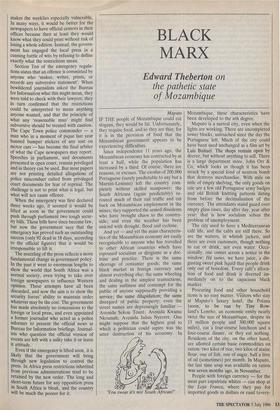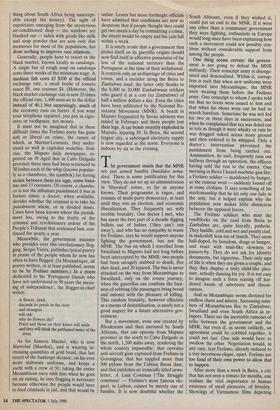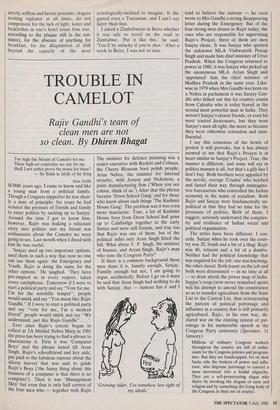BLACK MARX
Edward Theberton on
the pathetic state of Mozambique
Maputo IF THE people of Mozambique could eat slogans, they would be fat. Unfortunately, they require food, and so they are thin; for it is in the provision of food that the Mozambican government appears to be experiencing difficulties. Since independence 11 years ago, the Mozambican economy has contracted by at least a half, while the population has increased by a third. Of course, there are reasons, or excuses. The exodus of 200,000 Portuguese (surely predictable to any but a Marxist-Leninist) left the country com- pletely without skilled manpower; the South Africans (again predictably) re- routed much of their rail traffic and cut back on Mozambican employment in the mines; they supported the armed dissidents who have brought chaos to the country- side; and even the weather has been unkind with drought, flood and cyclone.
And yet — and yet the main characteris- tics of the Mozambican economy are easily recognisable to anyone who has travelled to other African countries which have espoused socialism or dirigisme as a doc- trine and practice. There is the same shortage of consumer goods; the same black market in foreign currency and almost everything else; the same wheeling and dealing in the simplest transactions; the same surliness and contempt for the public of anyone supposedly providing a service; the same dilapidation; the same disregard of public property; even the street names are depressingly familiar Avenida Sekou Toure, Avenida Kwame Nkrumah, Avenida Julius Nyerere. One might suppose that the highest goal to which a politician could aspire was the utter destruction of his economy. In You swear it's not South African?' Mozambique, these characteristics have been developed to the nth degree.
Maputo is a surreal city, even when the lights are working. There are uncompleted tower blocks, untouched since the day the Portuguese left. Much of the city could have been used unchanged as a film set by Luis Bufiuel. The shops remain open by decree, but without anything to sell. There is a large department store, John Orr & Co, which looks as though it has been struck by a special kind of neutron bomb that destroys merchandise. With mile on mile of empty shelving, the only goods on sale are a few old Portuguese army badges and old British knitting patterns dating from before the decimalisation of the currency. The attendants stand guard over empty glass cases, day after day, year after year: that is how socialism solves the problem of unemployment.
The city used to have a Mediterranean café life, and the cafés are still there. So are the waiters, in whitish jackets, and there are even customers, though nothing to eat or drink, not even water. Occa- sionally, one comes across a notice in the window: Ha sumo, we have juice, a dis- gusting sweet pink liquid that people drink only out of boredom. Every café's alloca- tion of food and drink is diverted im- mediately on to the capacious black market.
Procuring food and other household items is no easy matter. Visitors who stay at Maputo's luxury hotel, the Polana (soon, to be run by Tiny Row- land's Lonrho, an economic entity nearly twice the size of Mozambique, despite its 13 million people and 300,000 square miles), eat a four-course luncheon and a four-course dinner, or they eat nothing. Residents of the city, on the other hand, are allotted certain basic commodities on ration: two kilos of rice, two kilos of maize flour, one of fish, one of sugar, half a litre of oil (sometimes) per month. In Maputo, the last time soap was available on ration was seven months ago, in November.
People with foreign currency — for the most part expatriate whites — can shop at the Loja Franca, where they pay for imported goods in dollars or rand (every- thing about South Africa being unaccept- able except the money). The sight of expatriates emerging from the mysterious air-conditioned shop — the windows are blanked out — laden with goods like milk and soap powder that are now only dim memories for most of the population, has done nothing to improve race relations.
Generally, people have to resort to the black market, known locally as candonga. A single bar of rough soap on candonga costs three weeks of the minimum wage. A medium fish costs £5 $100 at the official exchange rate, a small bottle of tomato sauce $9, one coconut $4. (However, the black market exchange rate is now 35 times the official rate, 1,400 meticais to the dollar instead of 40.) Not surprisingly, much of the economy runs on barter: if you want your telephone repaired, you pay in cigar- ettes or toothpaste, not money.
It must not be imagined that in these difficult times the Frelimo party has gone soft or liberal on crime, the causes of which, as Marxist-Leninists, they under- stand so well in capitalist societies. Noti- cias, the Maputo daily newspaper, re- ported on 10 April that in Cabo Delgado province three men had been sentenced to 30 lashes each of the whip (known popular- ly as o chamboco, the sjambok) for having stolen between them ten eggs, some bana- nas and 15 coconuts. Of course, o chambo- co is not the inhuman punishment it was in former times: a doctor, when available, decides whether the criminal is to take his punishment whole, or in divided doses. Cases have been known where the punish- ment has, owing to the frailty of the criminal and revolutionary ardour of the People's Tribunal that sentenced him, con- tinued for nearly a year.
Meanwhile, the government minister who presides over this revolutionary flog- ging, Sergio Vieira, publishes lyrical poetry in praise of the people whom he now has often to have flogged. (In Mozambique, all poetry written, or at least published, seems to be by Frelimo ministers.) In a poem dedicated to his 'Portuguese friends who have not understood in 50 years the mean- ing of independence', the flogger-in-chief writes:
A flower, tired, discards its petals in the river and strangers will ask: why do flowers die?
Poets and those on their knees will smile and they will drink the perfumed water of the river.
As for Samora Machel, who is now Marechal (Marshal), and is wearing in- creasing quantities of gold braid, that last resort of the bankrupt dictator, on his ever more elaborate uniforms, and keeps a yacht with a crew of 50, taking the entire Mozambican navy with him when he goes on an outing, he says flogging is necessary because otherwise the people would have to feed criminals in jail, and that would be
unfair. Lesser but more forthright officials have admitted that conditions are now so desperate that if people thought they could get two meals a day by committing a crime, the streets would be empty and the jails full within a week.
It is surely ironic that a government that prides itself on its guerrilla origins should now find itself in effective possession of far less of the national territory than the Portuguese at the time of their withdrawal. It controls only an archipelago of cities and towns, and a corridor along the Beira to Zimbabwe road, the latter only thanks to the 8,000 to 10,000 Zimbabwean soldiers who guard it at a cost (to Zimbabwe) of half a million dollars a day. Even the cities have been infiltrated by the National Re- sistance Movement (MNR). A beach in Maputo frequented by Soviet advisors was mined in February and three people lost their legs. A car bomb recently exploded in Maputo, injuring 50. In Beira, the second largest city, a sabotaged electricity supply is now regarded as the norm. Everyone is indoors by six in the evening.
The government insists that the MNR are just armed bandits (bandidos arma- dos). There is some justification for this view. They do not set up an administration in 'liberated' zones, so far as anyone knows. Their programme is vague, and consists of multi-party democracy, at least until they win an election, and economic liberalisation. They frequently act with terrible brutality. One doctor I met, who has spent the best part of a decade digging bullets out of babies (`they can't run away'), and who has no sympathy to waste for Frelimo, says he would support anyone fighting the government, but not the MNR. The bus on which I travelled from Swaziland to Maputo had not long before been intercepted by the MNR: two people had been savagely stabbed to death, five shot dead, and 20 injured. The bus is never attacked on the way from Mozambique to Swaziland, only on the return journey, when the guerrillas can combine the busi- ness of robbing (the passengers bring bread and onions) with the pleasure of killing. This random brutality, however effective as a means of destabilisation, is surely not a good augury for a future alternative gov- ernment.
But a movement, even one created by Rhodesians and then nurtured by South Africans, that can operate from Maputo province in the south to Cabo Delgado in the north, 1,200 miles away, rendering the whole country impassable; that operates anti-aircraft guns captured from Frelimo in Gorongosa; that has toppled more than 500 pylons from the Cabora Bassa dam, and that publishes an ironically titled news- letter, A Luta Continua (The Struggle continues' — Frelimo's most famous slo- gan), in Lisbon, cannot be merely one of bandits. It is now doubtful whether the South Africans, even if they wished it, could put an end to the MNR. If it were any other than a communist government they were fighting, enthusiasts in Europe would long since have been explaining how such a movement could not possibly con- tinue without considerable support from among the people.
One thing seems certain: the govern- ment is not going to defeat the MNR militarily. Their conscript army is disorga- nised and demoralised. Within it, corrup- tion is such that when new uniforms were imported into Mozambique, the MNR were wearing them before the Frelimo army. One conscript to whom I spoke told me that no boots were issued to him and that when his shoes wore out he had to march barefoot. Sometime he was not fed for two or three days in succession, and when he complained that tea was doled out in tots as though it were whisky or rum he was dragged naked across stony ground and then ordered to be whipped. Only a doctor's intervention prevented the punishment from being carried out. Ammunition, he said, frequently runs out halfway through an operation, the officers having sold the rest to the enemy. One morning in Beira I heard machine-gun fire: a Frelimo soldier — maddened by hunger, so the rumour went — suddenly loosed off at some civilians. It says something of his marksmanship that he hit only one lady in the arm; but it helped explain why the population now makes little distinction between the opposed forces.
The Frelimo soldiers who man the roadblocks on the road from Beira to Zimbabwe are, quite literally, pathetic. They huddle, cold and wet and poorly clad, in makeshift lean-tos of thatch. They seem half-doped, by boredom, drugs or hunger, and react with snail-like slowness to passers-by. They do not ask for identity documents, but cigarettes. Their only sign of life is when they are given a couple, and they they display a truly child-like plea- sure, actually dancing for joy. It is not easy to imagine such a force scaring off har- dened bands of saboteurs and throat- cutters.
And so Mozambique seems destined for endless chaos and misery. Increasing num- bers of Mozambicans flee to Zimbabwe, Swaziland and even South Africa as re- fugees. There are the inevitable rumours of talks between the government and the MNR, but even if, as seems unlikely, an agreement could be cobbled together, it could not last. One side would have to swallow the other. Negotiation would, in any case, tear Frelimo, already reduced to a tiny incestuous clique, apart. Frelimo are too fond of their own power to allow that to happen.
After more than a week in Beira, a city that has not seen a tomato for months, one realises the vital importance to human existence of small pleasures, of frivolity. Showings of Vietnamese films depicting utterly selfless and heroic peasants, slogans inviting vigilance at all times, do not compensate for the lack of light, water and bedclothes in one's hotel (once four star, according to the plaque still in the ent- rance), for the absence of anything for breakfast, for the dilapidation of filth beyond the capacity of the most scatologically-inclined to imagine. It dis- gusted even a Tanzanian, and I can't say fairer than that.
I asked a Zimbabwean in Beira whether it was safe to travel on the road to Zimbabwe. 'Put it like this,' he said. `You'll be unlucky if you're shot.' After a week in Beira, I was not so sure.




















































 Previous page
Previous page